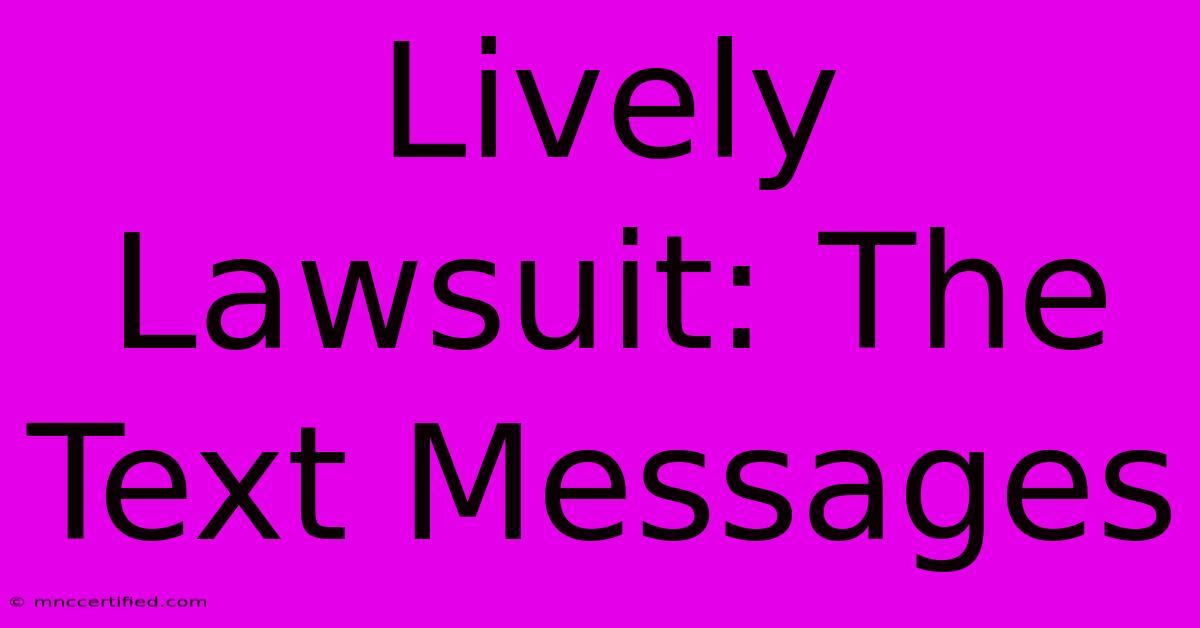Lively Lawsuit: The Text Messages

Table of Contents
Lively Lawsuit: The Explosive Power of Text Messages as Evidence
The courtroom drama is heating up, and this time, the star witness isn't a person, but a seemingly innocuous text message. In today's digital age, text messages are no longer just casual conversations; they're powerful pieces of evidence capable of swaying the outcome of even the most complex lawsuits. This article dives into the increasingly significant role of text messages in legal battles, exploring their admissibility, challenges in presenting them, and their impact on verdicts.
The Rise of Text Messages as Legal Evidence
Text messages, with their immediacy and informal nature, often capture candid thoughts and intentions that are absent from more formal communication. This makes them a goldmine of information for lawyers, capable of proving or disproving crucial elements of a case. Whether it's a breach of contract, a defamation claim, or a criminal investigation, text messages can provide irrefutable evidence.
Types of Cases Where Texts are Crucial:
- Breach of Contract: Text messages confirming agreements, outlining terms, or acknowledging a breach can be highly persuasive in contract disputes.
- Defamation: Text messages containing defamatory statements can be used to prove the intent and impact of harmful comments.
- Criminal Cases: Text messages can corroborate witness testimony, establish a timeline of events, or even provide a confession.
- Family Law Disputes: Texts revealing infidelity, threats, or plans related to child custody battles are often used.
- Employment Disputes: Messages discussing workplace harassment, discrimination, or unfair dismissal practices can play a vital role.
Admissibility of Text Messages in Court
While incredibly valuable, text messages aren't automatically admissible as evidence. They must meet certain criteria to be considered legally sound:
- Authentication: The court must be convinced the messages are genuine and haven't been altered. This often involves presenting metadata showing the date, time, and sender/receiver information.
- Relevance: The messages must be directly relevant to the issues in the case. Irrelevant texts are inadmissible.
- Hearsay: Text messages are often considered hearsay (out-of-court statements offered to prove the truth of the matter asserted). However, exceptions exist, such as statements made against interest or excited utterances.
- Privacy Concerns: Courts must balance the evidentiary value of the messages against the privacy rights of individuals. This is especially important in cases involving sensitive personal information.
Challenges in Presenting Text Message Evidence
Presenting text messages effectively requires careful preparation and attention to detail:
- Data Recovery: Retrieving deleted or lost text messages might require specialized forensic techniques.
- Chain of Custody: Maintaining a meticulous record of how the messages were obtained, stored, and handled is crucial to establish authenticity.
- Contextualization: Presenting messages out of context can misrepresent their meaning, so careful explanation is necessary.
- Expert Testimony: In complex cases involving data recovery or encryption, an expert witness might be needed to authenticate and explain the messages.
The Impact of Text Messages on Verdicts
The impact of text messages as evidence can be substantial. A single text message can:
- Corroborate or contradict other evidence: Texts can strengthen or weaken the credibility of witnesses or other forms of evidence.
- Provide a motive or intent: Messages revealing underlying intentions can greatly influence the court's interpretation of events.
- Shift the balance of power: A crucial text message can dramatically alter the trajectory of a case, leading to settlements, dismissals, or convictions.
Conclusion: The Future of Text Messages in Legal Proceedings
The use of text messages as evidence in legal proceedings is only going to increase in the future. As our reliance on digital communication grows, so will the importance of understanding how to legally obtain, present, and utilize this powerful form of evidence. Lawyers must stay abreast of evolving legal precedents and technological advancements to effectively leverage text messages in their cases. The "lively lawsuit" often hinges on the seemingly small details—and in today's world, those details are frequently found within a simple text message.

Thank you for visiting our website wich cover about Lively Lawsuit: The Text Messages. We hope the information provided has been useful to you. Feel free to contact us if you have any questions or need further assistance. See you next time and dont miss to bookmark.
Featured Posts
-
Barcas Winning Streak Snapped 9 4 Loss
Dec 22, 2024
-
Patrick Mahomes Today Chiefs Game Update
Dec 22, 2024
-
Aston Villa Upsets Man City
Dec 22, 2024
-
Cwa Statement Social Security Fairness Act
Dec 22, 2024
-
Citys Aston Villa Slip Defeat Details
Dec 22, 2024